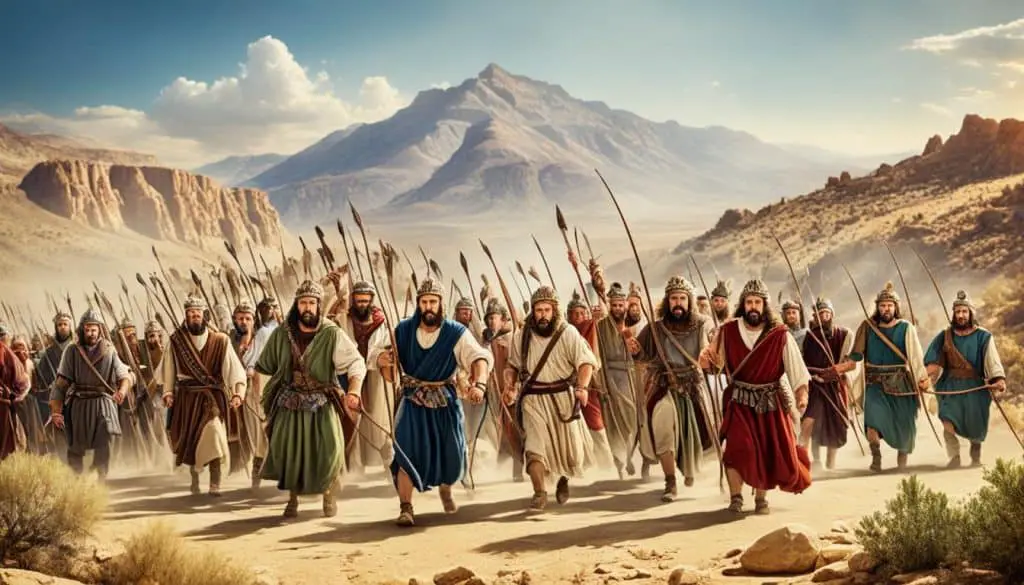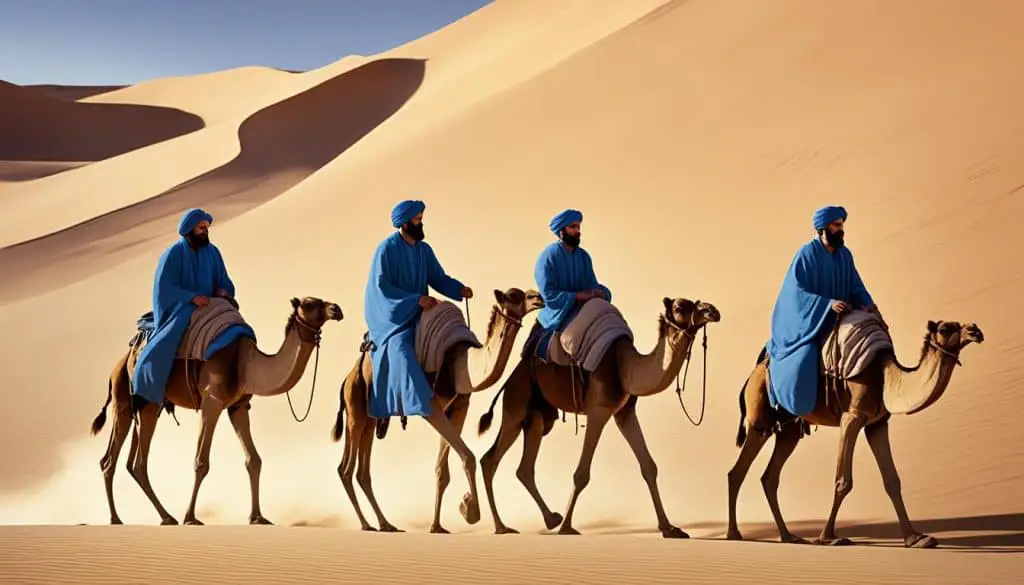Table of Contents
Do you ever think about how people in biblical times found food? They didn’t have grocery stores. Let’s look at how biblical figures survived by hunting and gathering. We’ll uncover the amazing stories of those who thrived using these ancient methods.
Let’s dive into the lives of some biblical characters who lived off the land. We’ll start with Adam and Eve, who ate plants. Then, we’ll explore Esau’s hunting skills. These stories show us how they survived without the comforts we know today.
Now, think about the Israelites during the Exodus and the Rechabites. How did they make it in the desert? How did the Rechabites live as nomads? We’ll find the fascinating answers to these questions. Let’s explore the world of biblical hunting and gathering.
Let’s discover the resourcefulness of these ancient people together. We’ll find out how they survived and thrived. Their stories might even teach us some wisdom for our lives today.
Adam and Eve: Gathering a Plant-Based Diet
Let’s start our journey with the story of Adam and Eve. In Genesis 1:29, God gave them all plants and fruit trees as food. This made Adam and Eve’s diet mainly plant-based. They gathered plants to eat, according to this story.
The Bible says in Genesis 1:29, “I give you every seed-bearing plant on the face of the whole earth and every tree that has fruit with seed in it. They will be yours for food.” This verse shows how many plant foods were available to Adam and Eve. It shows that living on a plant-based diet was essential.
This divine act shows the importance of plants for Adam and Eve’s health. God made sure they had many types of plants to meet their food needs. It is a clear example from Genesis of the goodness of a plant-based life.
The Health Benefits of a Plant-Based Diet
Eating more plants can do wonders for your health. Fruits, veggies, and other plant foods are full of vitamins and fiber. They are also low in bad fats and cholesterol, which helps keep you healthy. Eating this way can lower the risk of heart problems and help you manage your weight.
- Promotes cardiovascular health
- Supports digestive function
- Enhances weight management
- Reduces the risk of chronic diseases
- Boosts overall well-being
Many people now see the value of a diet focused on plants. Knowing that Adam and Eve ate this way in ancient times is interesting. It shows us that choosing plant-rich foods is smart for staying healthy.
Let’s now explore the story of another Bible character who teaches us about the importance of hunting for food.
Esau: A Skilled Hunter
Let’s talk about Esau, a man known for his hunting in the Bible. Genesis 25:27 tells us he was a hairy man who was great at hunting. This shows how important hunting was for food back then.
Esau wasn’t just hunting to eat. He was skilled at it and knew how to find and catch animals. This helped feed not just him, but his family too.
In Genesis 25:27, Esau is described as someone who was at home in the wild. He used the outdoors to get food and take care of his family. Knowing how to hunt made him very important in his time.
Esau’s hunting skills were so impressive that they led to a big event with his brother Jacob. It changed their lives. This shows how hunting was more than just finding food. It played a big role in many stories of the Bible.
“And the boys grew: and Esau was a cunning hunter, a man of the field; and Jacob was a plain man, dwelling in tents.” –Genesis 25:27
Esau’s tale reminds us of the bond between people and nature. It shows how clever and adaptable our ancestors were. They found ways to overcome the tough parts of life.
Next, we’ll learn about Ishmael. He, too, had a big part in the Bible, especially because of his hunting in the wild.

Ishmael: The Archer in the Wilderness
Our journey into biblical times now focuses on Ishmael. In Genesis 21:20, Ishmael is described as a skilled archer, living in the wild. His life was all about hunting, showing us how hunters survived back then.
Ishmael’s tale shows us how hunting was done in the wild. Being an archer, he used his great aim to get food. Hunting helped him live in places that were tough for others.
The wild offered Ishmael a lot of animals but also tough land to live in. With his bow and arrow, he got good at hunting, learning how to catch his prey. This needed not just strength but also knowing the wild well.
Hunting was a way to adapt and be smart in old times. Ishmael and others like him learned from nature to live. They had to really know the land and how animals act to eat well.
“Ishmael, the skilled archer of the wilderness, exemplifies the hunting lifestyle prevalent in biblical times. His expertise in hunting allowed him to navigate the challenges of the wilderness and secure sustenance for survival.”
In the world of biblical hunters, Ishmael was known for being an archer. He showed how important hunting was in the past. Ishmael’s story is about survival, but also about being clever and tough in hard times.
The Israelites during the Exodus: From Hunting to Agriculture
The story of the Israelites during the Exodus uncovers a fascinating journey of survival. They wandered through the desert, relying on hunting and gathering. It was a big change from their usual way of life to starting to grow their own food.
In the beginning, the Israelites couldn’t farm in the desert. They had to find food in the wild. They hunted animals and picked plants and fruits to eat. This was how they got the proteins and nutrients they needed to survive.
God then gave them instructions. Exodus 23:19 said not to boil a young goat in its mother’s milk. This showed they needed to start farming instead. They began to grow crops and raise animals, marking a big step in their journey.
Cultivating the Land
The Israelites learned to farm and stopped relying on hunting and gathering. They started to grow barley, wheat, lentils, olives, and grapes. This change gave them more food and made their lives more stable.
They also started to have special celebrations during the harvest. They thanked God for helping them change from hunters to farmers. This transition was very important for them.
“Our ancestors were hunters and gatherers, but through the guidance of God, we learned to till the land and become farmers, securing our livelihood.” – Joshua
The Significance of the Transition
Switching to farming was a big step for the Israelites. It allowed them to build houses and live in settled areas. Farming made sure they always had enough food. This made their communities grow.
Also, farming became an important part of their beliefs and traditions. For them, working the land was a sign of their promise with God. It showed they were connected to something higher.

“We went from living day-to-day, hunting and gathering, to cultivating the land and reaping the rewards of our labor. It was a transformative experience that shaped our identity as a people.” – Miriam
The Israelites’ journey from hunting to farming shows their ability to adapt. It also highlights the importance of learning new ways to survive and succeed.
Next, we’ll look at the Rechabites’ story. They chose not to farm, which is another interesting part of the Bible.
The Rechabites: A Nomadic Lifestyle
Jeremiah 35 tells us about the Rechabites, Jehonadab’s descendants. These people chose a nomadic life. They didn’t farm but hunted and gathered for food.
The Rechabites stuck to the teachings of Jehonadab in a notable way. They lived in tents and didn’t farm, plant vines, or drink wine. This showed their deep loyalty to their heritage.
“We have obeyed everything our forefather Jehonadab commanded us. Neither we nor our wives nor our sons and daughters have ever drunk wine or built houses to live in or had vineyards, fields, or crops.” – Jeremiah 35:8-9
Back then, most people farmed their food. But the Rechabites did things differently. They chose to move around and rely on what they found in nature.
The focus of Jeremiah 35 was on the Rechabites’ life without wine. Yet, it hints they found food by hunting and gathering in empty lands. This way of living was part of their nomadic life.
Below, we’ll look closer at the Rechabites’ unique way of life:
| Key Characteristics | Description |
|---|---|
| Living Arrangements | The Rechabites lived in tents, showing they were ready to move. |
| Abstinence from Wine | They avoided wine, following Jehonadab’s rules. |
| No Agricultural Endeavors | Farming was not for them. They chose hunting and gathering. |
| Heritage and Legacy | They handed down Jehonadab’s teachings over time. |
The Rechabites’ way of life shows their strength and culture. It proves there were other good ways to live in those times. Their story makes us think about our own choices.

Exploring Other Instances of Hunting and Gathering
We have looked at stories like Adam and Eve, Noah, and David in the Bible. These stories show how hunting and gathering were big parts of life in ancient times. Other parts of the Bible also talk about these activities.
The story of Noah after the flood is a good example. Noah and his family had to find their own food in the new world. They used hunting and gathering to eat and help the earth recover. They could eat “every beast that moves on the earth and every bird of the air,” the Bible says (Genesis 9:3). So, hunting and gathering were key for them.
David also used skills from hunting and gathering for his work. Before he was a king, he looked after his father’s sheep. This included fighting off animals that wanted to hurt the sheep. Being a shepherd helped David learn skills that made him a good leader later (1 Samuel 17:34-36).
In Proverbs, hunting and gathering are used as examples for wisdom and hard work. Proverbs 6:6-8 tells us to learn from the ant. It gathers food in the summer to have for the winter, showing the value of being ready for tough times.
“Go to the ant, you sluggard!
Consider her ways and be wise,
Which, having no captain,
Overseer or ruler,
Provides her supplies in the summer,
And gathers her food in the harvest.” – Proverbs 6:6-8
These Bible examples show the importance of hunting and gathering. They remind us of how our ancestors survived. They teach us about being smart and ready, even in our modern lives.

Strategies for Modern Life
Though we don’t hunt and gather for food now, we can still learn from the Bible stories. The lessons of working hard and being ready can help us today.
We can learn from the ant in the Bible. It saves food for the winter, teaching us to plan and save. This can help us be ready for hard times.
Also, being able to face different situations is important. Like David the shepherd who became a king, we should grow skills that work in many areas. This makes us adaptable and successful.
From the Bible’s hunters and gatherers, we can learn about success and strength. Even if our lives are different, these lessons about working hard and being smart are still true today.
Reflections on the Hunters and Gatherers in Bible
We end our look at the biblical hunters and gatherers with great lessons. They showed incredible resourcefulness and adaptability. Their use of hunting and gathering for food teaches us a lot.
The tales of Adam and Eve, Esau, Ishmael, the Israelites in Exodus, and the Rechabites show different survival methods. They faced tough environments but found ways to survive. It shows how they adapted and managed to live off the land, even in hard times.
Adam and Eve’s story highlights a plant-based lifestyle. Esau’s tale focuses on hunting skills. Each story gives us a special look at the role of hunting and gathering in ancient times. They remind us of the deep connection between people and nature.
Looking back at these biblical figures, we find timeless lessons. They teach us to be resourceful and adaptable. And most importantly, they show us how to live in harmony with nature. Their stories can guide us to a better future by learning from the past.




